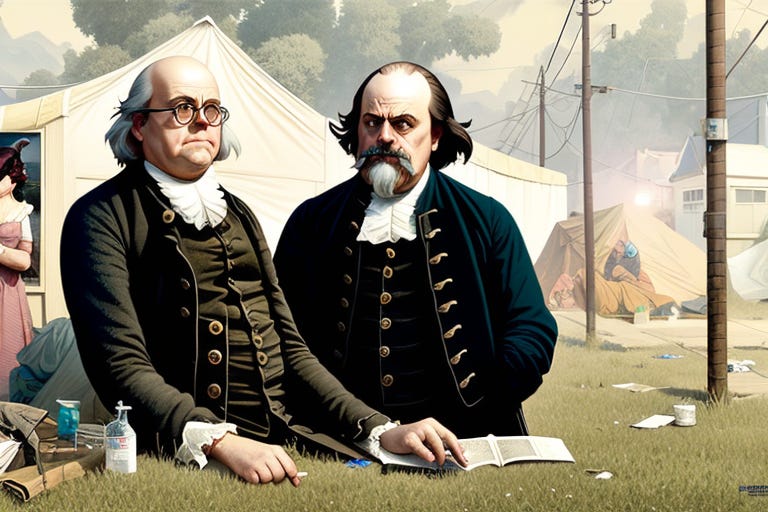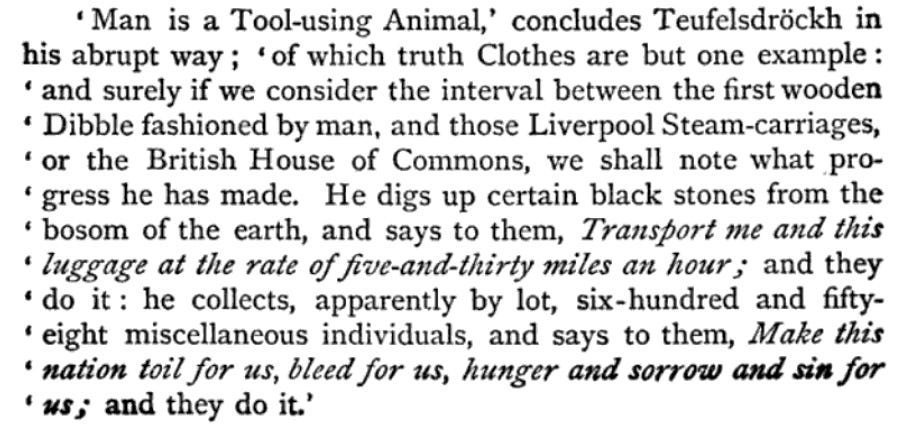The Scandal of White Slavery to Tech
Routing around an uncanny impediment to rebuilding on rock, not sand.
Almost 1 million views for a troublesome, troubling video of an attentive young mother in the depths of downward white mobility. And a fresh round of intractable debate between Christians and Nietzscheans over just how to feel about it. Kruptos, speaking for the former:
The “dissident right” must understand that this is their base, their future. These are their people. If you dump on her for using seed oils, you are the problem. If you want to look down at her, you are the problem… This is what “working class” politics looks like. You must be as comfortable sitting at her table receiving her hospitality as you are in your study reading Schmitt, Burnham and Ellul. Maybe more so. Her interests are your interests. This is your politics.
If, for the Nietzscheans’ part, you hate or deny God and Christ and “humanity as such” with all the pity and “togetherness” it entails, it’s necessary and inevitable that the object of the culmination of this distaste and enmity is the genericized white failchristian, the stock character of the seemingly irredeemable kind epitomized by the girl in the video. Even a relatively squishy or practical Nietzschean would insist we can surely agree, whatever our inclinations, that there simply isn’t time to indulge in anything loving, humble, and patient toward this new class of disgustingly abased white Americans. The pathos of distance is no longer just an inoculant against the sickness of the diseased spiritual slave. Under the circumstances of today’s accelerating rot, it’s a life hack, an escape from the black hole swallowing up even what just a generation ago was the most powerful and excellent race in the world. So a conciliatory Nietzschean might say.
And, no question, it is outrageous in an uncanny new way to see just how far the Anglo has fallen in so short a time, and not just the Anglo in general but the embodiment of the “fix” to all that was wrong with the ethno-denominational problem of the Old World West — the white American. It was here in America that the vast experiment was undertaken to peacefully and prosperously transcend national and confessional identities, the two great sources of massively violent division in Christendom, melting them all down in a pot to forge metallurgically, or perhaps alchemically, into a sort of ultimate form of Western European Christian, the most syncretic and unified one possible, “nondenominational” and “post-ethnic.” It must be concluded that this specific experiment and the hypotheses behind it have failed despite — perhaps because of — its initial apparent success.
Yet the controversy doesn’t really concern the fact of the failure. The sticking point is why. Christians are generally inclined to blame ideologies, Nietzschean or otherwise — in short, the grand struggle to replace religion with politics, or to turn politics from what it really is and must be into some other thing imagined capable of substituting for, so as to overcome, religion. Nietzscheans prefer to blame Christianity in train with its spinoff slave moralities, many of which of course, include various anti-Christian ideologies themselves. Letting the old man speak for himself:
BEHIND THE POISON
It would make sense Nietzsche would want to be reluctant when considering what has sent the ultimate triumphal figure of the white Christian American into such terrible straits. It’s one thing to consider the miserable situation of the Old World Westerner, for whom the long and blood-drenched impasse of ethnic and confessional strife left the living with a profound, yet even so, hollowed out, longing for a servile end state denuded of all true identity and celebratory only of “difference.” Yes, please, final equality, totalitarian equality, the equality of mere objects! But in America? Where the wildness of the ultimate actor gave the syncretic, generic masters of the universe the opportunity to serve singly and together as a blank white canvas on which to repaint the world, the cosmos, the human? How could even they go so wrong, fall so far, so fast?
Today even those who’d deny they were Nietzscheans (rationalists, scientists with a good conscience, people of “the fact”) are apt to agree that if Christianity has, as it would seem, failed so comprehensively in America — the place where obviously it had achieved the broadest adoption and fervor across the most diverse population at a time of its country’s greatest power and spiritual authority — then Christianity must suck, must have something irredeemably broken or obsolete about it. First, it imploded in Europe; now it implodes here; time to #MoveOn.
And of course, this is “rational” — ! But there is another answer to the scandal of the sudden and shocking depth of white slavery the generic American Christian and post-Christian has sunken into and sinks even further still.
This answer is that the triumphant group in question did not go astray for the reason Nietzsche supplies — an “excess” of Christianity — but because of a deficit, and one particular kind of deficit, one caused by a turning away from the Ancient Church and its disciplines of spiritual experience, and a turning toward something else.
WHAT A TOOL
Let us turn for a moment to a page from the 1958 Annual Report of the Board of Regents of the Smithsonian Institution.
Oakley, an English anthropologist and paleontologist, gained fame in his day as an elite debunker, having DESTROYED Piltdown Man with facts and logic. Although at least one obituary noted the popularity of his annual Christmas parties, I can’t find any specifics on his own religious faith or upbringing, if any, although I can add that he was also the author of the highly popular book Man the Tool-Maker.
It is revealing enough to follow his train of thought above that only Darwinianism really obliged the ordinary person to consider what if anything truly set Man apart from the animals, and to land on the viewpoint first expressed by Ultimate American Ben Franklin that, yes, we are animals, just like the rest, but for the one saving fact — saving to our pride — that we make the tools around here. Therefore man must not just be the tool-making animal, but the animal ruled by those who make the tools; and not just by the tool-makers or even the best at making the tools, but those who determine the trajectory and aim of toolmaking, the research agenda, and who ensure that said agenda is arrived at before anyone else can come along and muck things up by risking the pursuit of some other line or lines of inquiry and development.
FROM GOD-MADE TO DEVIL’S DUNG
Earlier we spent some time on Joseph Heller’s artful insistence that “the spirit gone, man is garbage.” Quite the contrast it now strikes with Carlyle’s contention, which deserves a sidebar of its own: the line is from his Sartor Resartus, “The Tailor Retailored,” perhaps a riff off of Byron’s The Deformed Transformed, and definitely a variation on friend and mentor Goethe’s Faust.
What do tools have to do with clothes, you ask? Everything:
Read on!
“Man”… “he”… “us.” Who raids the bosom of the earth? Who chooses what to retrieve? Who chooses why? Who speaks to the stones, and chooses what to command of them? Who speaks to “miscellaneous individuals” like a heap of excavated rock? Who commands them to sin on their behalf?
Not an abstraction called “Man”. Not “us” in particular. The responsible party in particular is those who strive to be the mortal gods of toolmaking. But it is also true that responsibility rests in a general, unabstract way with humanity itself. What is so significant about us is not that we make tools but why we make them, and why we make them is not for their own sake, of course, but because they promise to confer on us the recursive power to become as gods.
THE END OF THE LAST MAN
What remedies us of this fatal error is what solves the mystery of the latter-day Fall of the seemingly ultimate person — the false New Adam and Last Man — which the generic white American Christian became.
And of which, by the grace of God, he or she can be cured.











*** This answer is that the triumphant group in question did not go astray for the reason Nietzsche supplies — an “excess” of Christianity — but because of a deficit, and one particular kind of deficit, one caused by a turning away from the Ancient Church and its disciplines of spiritual experience, and a turning toward something else. ***
This is how I feel.
A lot of Nietzsche's criticisms are directed at the Catholic Church. At least from what I've seen. I'm yet to read an entire book from Nietzsche.
On those points, I agree with Nietzsche. The Catholic Church is a corrupt organization. I can see how anyone would be turned off by it. Considering that the church literally "makes up" dogma. They can twist anything to serve whatever purpose.
Purgatory is the example that first comes to mind. "Pay us, give us gold, and we'll "pray" to get your loved one(s) out of the place -- we just made up to get money..."
What's missing is the responsibility of the consumer. Just as most would not knowingly do business with a known murderer or you might chose to do business with those that support the same causes and values as you, we can do the same with our tech tools. Our dollars fund the tyranny of Big Tech. Our use and data fund the tyranny of Big Tech. There are alternatives. How many that publish here on Substack also have a MailChimp account? MailChimp has censored so many voices of freedom in the last 3 years it's impossible to ignore.